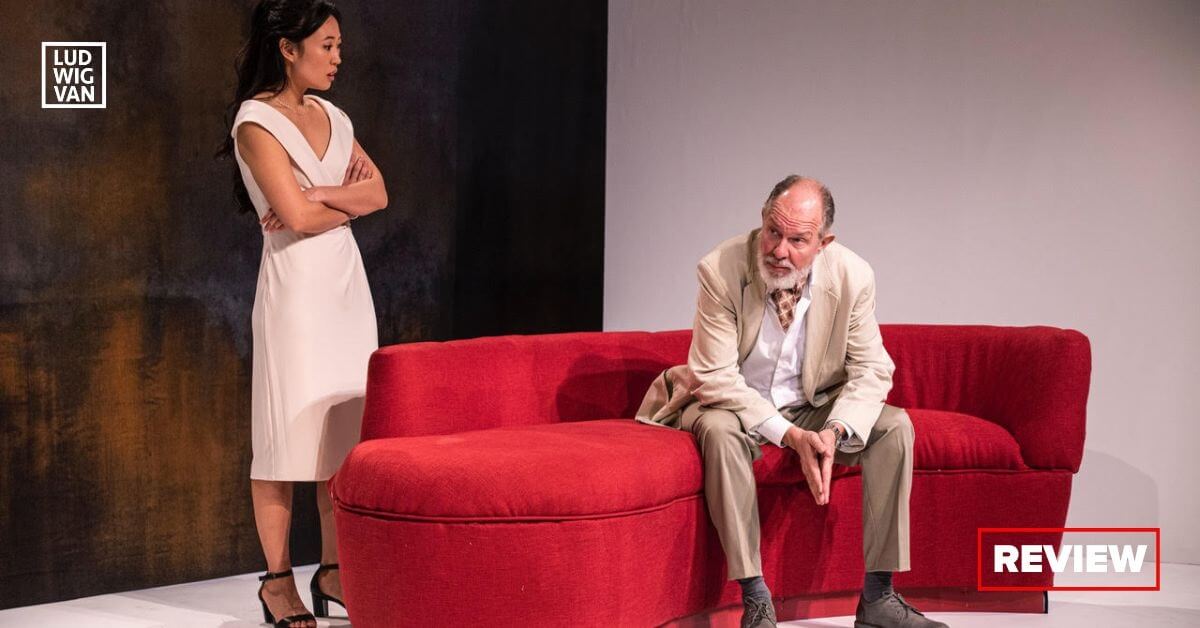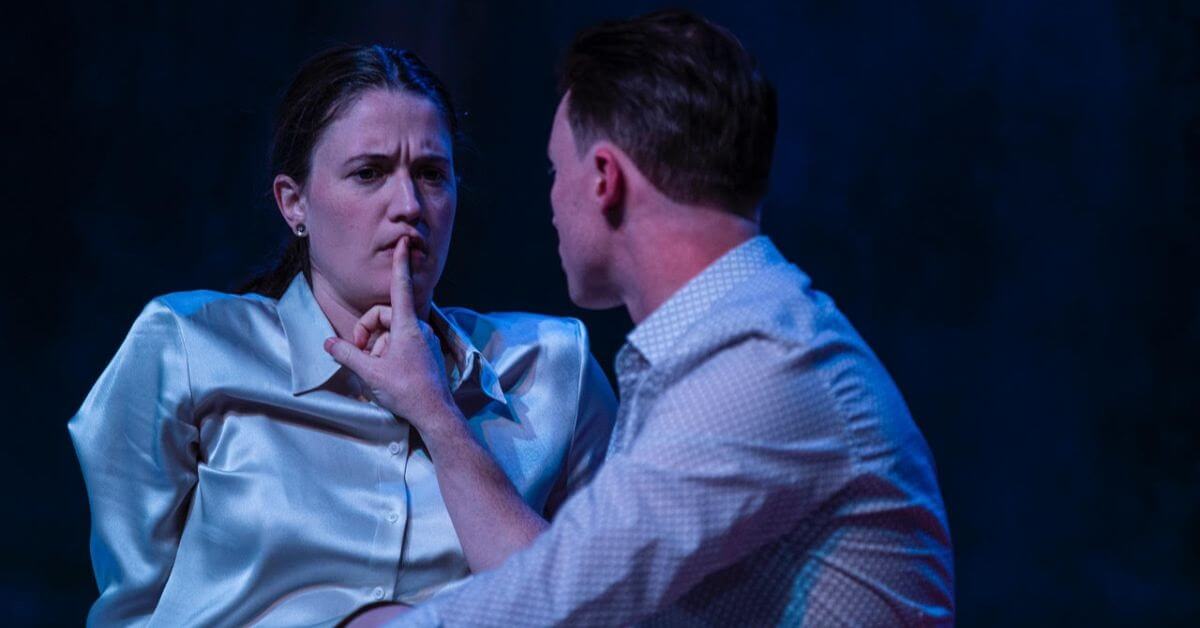
Tarragon Theatre/Post-Democracy, written by Hannah Moscovitch, directed by Mumbi Tindyebwa Otu, Tarragon Mainspace, Nov. 8 to Dec. 4. Tickets available here.
The prolific Hannah Moscovitch writes subversive plays.
She is like the oyster who scratches at sand to produce a pearl. Her gems are taut, pointed, and uncomfortable. Many of her au current plays present news headlines marching across the stage. She throws the dark side of real life back in your face.
Such is her new play Post-Democracy, which debuted at Winnipeg’s Prairie Theatre Exchange in 2021. That fine production was streamed during lockdown, so the Tarragon’s version is the first live stage showing. Seeing the play for a second time certainly deepens the experience.
Let’s start with the title. According to British political sociologist Colin Crouch, Post-Democracy is defined as a state that still possesses the trappings of democracy, but in reality, these institutions are hollow. The real governors are a small group of politico-economic elite.
In her play, Moscovitch characterizes this elite as global capitalism. Her characters are the top executives of a multinational car parts company, doing a buy-out deal somewhere in South America. They are the epitome of power, patriarchy and, by corollary, misogyny, striding giant-like over the Third World.
In a private 5-star hotel lounge, we find the CEO Bill (Diego Matamoros), his COO Lee, a distant relative (Jesse LaVercombe), and the CFO Justine (Chantelle Han), who is Bill’s adopted daughter. The fourth firm member is Shannon (Rachel Cairns), head of PR and marketing, but an underling, nonetheless.
Shannon’s role is to contain problems, and at the moment, she is facing a doozy. While the top dogs are deal-making abroad, back home, a brand manager called Gary has been accused of harassing female executive assistants.
As Justine points out, this scandal can only get worse, and they should jump on a plane and get back to contain it. But, then there is the deal that is so near and dear to Bill’s and Lee’s heart. The Board wants it, and they want it.
There is also a developing problem where they are. The previous night, both Bill and Lee were sent child sex workers to “sweeten” the deal. I gather that these young girls are actually called “sweeteners”.
Every one of the characters in the play has an open agenda, and some subtextual ones. I won’t elaborate too much, so as not to give anything away, but, suffice it to say, as the play progresses, obvious and hidden truths are revealed, which causes mounting tensions among the four.

I can mention two complications. Justine does a lot of philanthropic work, and one of her biggest charities deals with child sex workers and sex trafficking. For his part, Lee fancies Shannon, but the firm does not allow “fucking employees”.
Now here’s what makes Post-Democracy so interesting. You know, or can guess, the plot before it happens. Nothing will surprise you in terms of twists and turns. I literally knew the revelations to come the first time seeing the play, as will most of the audience.
So how does Moscovitch maintain interest if we can figure out the plot?
Her clever writing focuses on how her characters deal with the predictable turn of events. That’s the kicker, and the heart of how global capitalism rules the world. It’s not what happens, but rather, how the characters choose to react, or justify, or accuse, or compromise in the various obvious situations in which they find themselves.
Director Mumbi Tindyebwa Otu should be congratulated for fleshing out the characters. They could have all been cyphers, one-trick ponies, but she has clearly worked carefully on line delivery and physical action to maximize meaning. The subtext is constantly swirling around the stage. She is clearly a guru of detailing.
Diego Matamoros is one of the finest actors in the country, and turns in a beautifully nuanced performance as a world-weary man caught in circumstances beyond his control. His is more an internal rendering than an overt one, which is why it is always so wonderful to watch him on stage. You can see into his mind.
Jesse LaVercombe’s Lee is every inch the ambitious hustler who has clawed his way to the top. His intense, frenetic energy dominates the stage. As Justine, Chantelle Han may be a bit too strident, but gives a passionate performance nonetheless. She has a lot to be passionate about. Rachel Cairns’ Shannon manages to exude both competence and subservience at the same time, which is no mean feat — speaking out, but with deference.
Some old hands are responsible for the theatrical values, and the experience shows.
Teresa Przybylski’s set is simple yet gorgeous. Stark white walls, a beautifully sculptured red couch and glass liquor tray. The back wall is a huge abstract painting. In other words, the set is sleek, modern and classy. The three sided backdrop gives the impression of a cocoon.
Lighting designer Louise Guinand has worked magic. When the lights snap on at the beginning to reveal the set, it’s like a shock to the system. Intense bright lights are the key. Backlighting also allows the painting to dissolve to reveal a garden with trees. Characters walk there when they are not on stage, presumably in contemplation, and to remind the audience of their existence.
Sound designer John Gzowski has done himself proud with bursts of static, interpolated by Latin-like music sung in an unknown language. It didn’t sound either Spanish or Portuguese, yet it is this seductive music that reminds us of the teeming Third World that exists outside this hotel.
Moscovitch has always been an economical writer, but it feels like she has even tightened the dialogue more firmly since the Winnipeg production. Yet, within her carefully chosen words lies a multitude of meanings.
Running just 60 minutes, Post-Democracy is terse but powerful, provocative, yet disturbing.
#LUDWIGVAN
Get the daily arts news straight to your inbox.
Sign up for the Ludwig van Daily — classical music and opera in five minutes or less HERE.
- INTERVIEW | Actor Diego Matamoros Takes On Icon Walt Disney In Soulpepper Production Of Hnath Play - April 16, 2024
- SCRUTINY | Opera In Concert Shine A Light On Verdi’s Seldom Heard La Battaglia Di Legnano - April 9, 2024
- SCRUTINY | Lepage & Côté’s Hamlet Dazzles With Dance And Stagecraft Without Saying Anything New - April 5, 2024



